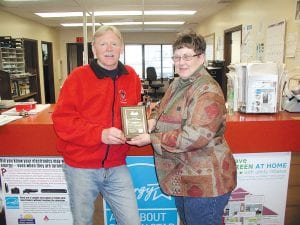Grand Marais Public Utilities Secretary Jan Smith presents an award to Buck Benson of Buck’s Hardware for his participation in the “Change a Light, Change the World” campaign sponsored by Grand Marais Public Utilities and the U.S. Environmental Protection Agency. The campaign encouraged Grand Marais Public Utilities customers to save money, energy and the environment by replacing their energy guzzling incandescent bulbs with more efficient compact fluorescent lamps (CFLs). The city is seeking two grants to improve its overall energy efficiency.

In an effort to conserve energy and save some money while doing it, Grand Marais city councilors voted Feb. 24 to apply for a pair of state grants at the urging of a local energy efficiency group.
George Wilkes and Buck Benson of the Cook County Local Energy Project (CCLEP) presented two opportunities for grants from the State Department of Commerce’s Office of Energy Security. The maximum amount the city is requesting totals $40,000 and if it is successful in receiving the funds, work would start almost immediately and be completed within a year and a half.
Thefirst project calls for installation of new bulbs and ballasts in about 100 light fixtures, most of which are in City Hall. Other city-owned facilities which would be included are the water and wastewater treatment plants, and the Rec Park office, bath houses and other buildings. City Administrator Mike Roth said the city staff was planning to have the work done anyway, as all of the fixtures in use now are old and inefficient.
“It’s something we’ve talked about doing for a couple years, and things are just starting to come together now,” Roth told council.
In order to take advantage of the grant, Roth said an electrical contractor evaluated the project and came up with a total project cost of just over $16,000. Thatnumber will be used on the grant application, but Roth said the figures may change, depending on the scope of the work which to date is still undecided. For instance, Roth said there may be a need to replace some of the fixtures in addition to the bulbs, and as with any project, once work begins there may be unexpected complications.
There are also other variables such as the amount of rebates the project would qualify for under the city’s Public Utilities Commission programs, exactly which projects would be done, and who would do the work. Although it is expected a local electrical contractor will be hired to do the work, the actual cost will remain unknown until a contract is awarded.
Council approved the grant application in the amount of $10,000, with a match by the city in the form of actual funds and rebate money from the PUC, of which the city is a customer.
According to figures presented by Roth, the new lights will save about $1,200 per year in energy costs, which means the project will pay for itself in 14 years. However, with additional rebates, the payback can be reduced to four to five years.
The second grant application is for a project that is a little less defined. Wilkes said the bulk of the project is the creation of an Energy Efficiency Plan for the city. He said the need is “certainly there,” and the plan would include an evaluation of lighting and energy usage in all residential, commercial and public buildings. Roth said that if the city can make enough improvements and reduce its overall energy consumption, customers could see a decrease in their power bills because the city would pay less from its provider through a lower “demand charge.” Council agreed to apply for the grant, which would basically fund a consultant to develop the plan and make a recommendation, in an amount of $29,390. Wilkes said he wrote the second grant application so that it requires no match from the city. If the grant is awarded, the city will have about 18 months to plan and implement the project.
Finally, councilors spent some time discussing ways in which they could work better with CCLEP, specifically in a more time-efficient manner to improve the city’s chances of receiving grant money. Wilkes said it is often difficult to keep tabs on what’s going on, because CCLEP itself has five different groups that meet independently, and grant announcements often present themselves unexpectedly and with a short timeframe for submission of the application.
“We get a lot of short notice grants, and sometimes when we come to you, we’ve just heard of it ourselves,” added Benson.
Council agreed to hold a workshop with the CCLEP representatives in March to try to improve communication between the two entities. Council members have expressed frustration in the past because they are routinely presented grant applications to vote on that are due in only a week or less, and with little or no attached information or explanation.


Loading Comments